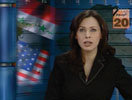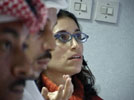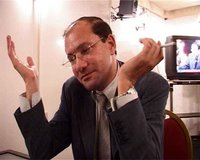Control Room (2004)
Director: Jehane Noujaim


An experiment in the public's right to know began when Al Jazeera began broadcasting in the 1990s. This news organization, headquartered in Qatar, was widely reviled for criticizing the governments of the Arab countries of the Middle East that contain its target audience. Attempts to silence Al Jazeera failed, and the organization is the now the most popular in the Arab world. The nascent organization, however, came up against one of its most dangerous foes in 2003 - the United States.
Al Jazeera - working on the brink of the invasion of Iraq, during the war, and at the moment Baghdad was occupied by coalition forces - is the subject of this film by Egyptian-American documentarian Jehane Noujaim. Noujaim does an excellent job of providing a thumbnail history of Al Jazeera, impressing the personalities of her 'characters' on the minds of viewers and then letting us see what reporting the war was like for this organization and others, including most of the major American news outlets.
Foremost among the individuals we get to know are Sameer Khader, Al Jazeera's senior producer; the rotund, affable Hassan Ibrahim, a former BBC reporter; and Cpt. Josh Rushing, press liaison with the U.S. military. Each of these individuals, most impressively Rushing, has some degree of skepticism about the information they are giving and receiving.
In Rushing's case, he comes to doubt what he is doing. Starting as a fresh-faced optimist who has arrived in Iraq to help liberate its people from the tyranny of Saddam Hussein, he rather quickly comes to see how the people all around him are spinning and counterspinning stories and information, how stories his office is issuing are picked up (or not) and used by both international and American news services, and how his basic assumptions about life may need scrutiny when he realizes he has been made nauseated by an Al Jazeera broadcast showing dead Americans, but reacted less strongly to a story shown the night before depicting Iraqi victims of an American bombing. He also learns that while Americans see the Palestinian/Israeli conflict as separate from Iraq, Arabs look at it as one issue.

Khader seems like a typical producer looking to please his audience. He's also learning how to be a journalist who combines the strong partisanship of European journalism with the more objective balance for which American journalists strive. For example, he is appalled by an interview his booker has arranged via satellite with an American in Washington, D.C. The man is an antiwar activist, and Khader is very angry that his booker did not get someone who could offer his audience a balanced viewpoint.
Ibrahim is, by far, the most fair-sighted of our main characters. He's aware of the many angles of news gathering and storytelling, seeing how all sides will view whatever actions are taken. He is sort of the Father Christmas of the story, a comforting presence in a sea of danger, death, and disinformation. Things get tense for Al Jazeera and other Arab news services when Don Rumsfeld comes to see them as hampering attempts for Americans to be effective 'liberators' because they keep showing the civilian costs of the war that are inciting anti-American sentiment. In one of the most damnable actions of the Americans during the whole war, bombs target Al Jazeera headquarters in Baghdad, as well as Abu Dabi News headquarters and a hotel known to house journalists. It is an action worthy of any totalitarian regime.
The film is eye-opening, warm, and, unfortunately, carefully edited to create a sequence of events that appear to make a causal link between Rumsfeld's complaints about Al Jazeera and the bombing of their reporters. That link may be very real, but it does weaken the case for the objectivity of this film. On the other hand, news organizations that take sides are not considered suspect in most parts of the world - including, despite protests to the contrary, the United States. Perhaps this is just another point of the documentary.
I highly recommend this film to anyone interested in journalism, especially those interested in how a free press might develop in formerly repressive areas of the world. l


0 Comments:
Post a Comment
<< Home